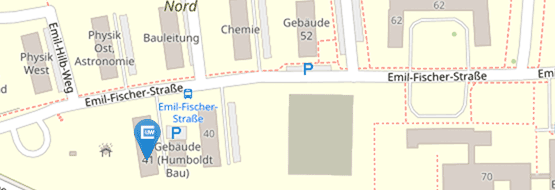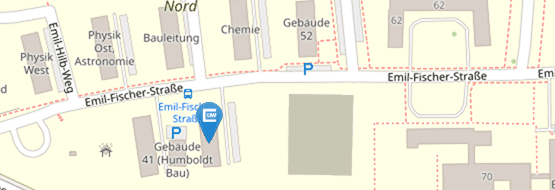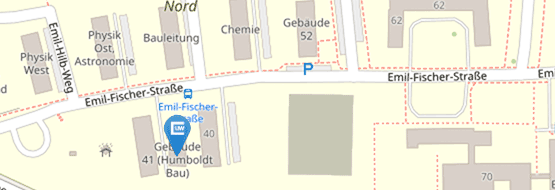Kooperationen
About the Collaboration:
The present collaboration concerns developing numerical models and protocols to achieve the control of quantum states of a magnetic nano-systems.
The control of a quantum state plays a central role on the development of new devices based on the quantum properties of the matter. Due to the complexity of the dynamics in a system of interacting particles, it becomes very useful to develop simple quantum models that capture the main physical properties of the system. Among the various possibilities, the description of the quantum dynamics provided by the Wigner representation based on the pseudo-distribution function or by the Bohm representation based on the pilot-wave mechanism, offer the possibility interpret the quantum dynamics in a classical-like framework. This property results very useful to extend classical results to the quantum regimes.
The objective of the research is to compare the theoretical results with experimental finding and to design realistic nanodevices in the field of the quantum computation and spintronics.
Collaboration Partners:
Laboratory: IPCMS - UMR7504
Principal Investigator: Giovanni MANFREDI
Partner 1: Dipartimento di Matematica e Informatica U. Dini, University of Florence
Investigator: Omar MORANDI
Partner 2: Universität Wurzburg, Lehrstuhl für Mathematik IX
Investigator: Alfio BORZI
About the Center:
The Hugo Steinhaus Center at the Institute of Mathematics and Computer Science (Director: Prof. Dr. Aleksander Weron) of Wroclaw University of Technology and the Chair of Scientific Computing (Head: Prof. Dr. Alfio Borzì) at the Institute for Mathematics of the University of Würzburg are the co-founder of the «Würzburg - Wroclaw Center for Stochastic Computing» (WWCSC) that provides an organizational and scientific platform to support scientific cooperation and to encourage the exchange of students between the above mentioned scientific groups and between the corresponding institutes.
A main focus of the WWCSC is to support a number of Master and PhD works based on joint research efforts with the possibility of co-supervision. The expertise of the research groups involved in the WWCSC boosts a successful long-term collaboration in the area of numerical and stochastic modeling, simulation, calibration, and control of stochastic systems with present and foreseen applications in natural sciences, engineering, and medicine.
The WWCSC initiative results from ongoing research collaboration on specific topics and mutual visits and seminars of the members of the two groups at the two universities. In particular, these topics cover various aspects of financial engineering, FARIMA modeling, testing ergodicity breaking in experimental data, fractional Fokker-Planck modeling, Fokker-Planck control strategies for stochastic Ito processes and piecewise deterministic processes, and anomalous transport in biological cells. In addition, a particular effort will be put in combining image processing methods and stochastic analysis techniques to analyze and model the dynamics of microbiological entities (e.g., proteins and telomeres marked with fluorescence) observed in 4D microscopy.
The group in Wroclaw has very high international visibility in the field of statistical analysis of experimental data, anomalous diffusion and identification of stochastic models. Recently, the Wroclaw group was granted a MAESTRO project on «Anomalous Dynamics of Complex Physical and Biological Systems». On the other hand, the group in Würzburg is well recognized for contributions in the field of Fokker-Planck models and their use for controlling and calibrating of stochastic processes. Recently, the Würzburg group successfully started the EU Marie Curie Multi-ITN STRIKE Project «Novel Methods in Computational Finance».
Ausgewählte Publikationen:
- M. Annunziato, A. Borzi, M. Magdziarz, A. Weron, A fractional Fokker-Planck control framework for subdiffusion processes, Optimal Control, Applications and Methods (2015)
- Masoumeh Mohammadi and Alfio Borzi, A Hermite spectral method for a Fokker-Planck optimal control problem in an unbounded domain, International Journal for Uncertainty Quantification (IJUQ), 2014.
- Suttida Wongkaew, Marco Caponigro, Alfio Borzi, On the control through leadership of the Hegselmann-Krause opinion formation model, Mathematical Models and Methods in Applied Sciences (M3AS), 25 (2015), 565-585.
- M. Annunziato, A. Borzì, F. Nobile, and R. Tempone, On the connection between the Hamilton-Jacobi-Bellman and the Fokker-Planck control frameworks, Applied Mathematics, 5 (2014), 2476-2484. S. Wongkaew and A. Borzì, Modeling and control through leadership of a refined flocking system, Mathematical Models and Methods in Applied Sciences (M3AS), 2014.
- M. Annunziato, A. Borzì, F. Nobile, and R. Tempone, On the connection between the Hamilton-Jacobi-Bellman and the Fokker-Planck control frameworks, Applied Mathematics, 2014.
- M. Mohammadi and A. Borzì, Analysis of the Chang-Cooper Discretization Scheme for a Class of Fokker-Planck Equations, Journal of Numerical Mathematics, 2014
- M. Annunziato and A. Borzì, Optimal Control of a Class of Piecewise Deterministic Processes , European Journal of Applied Mathematics, 25 (2014), 1-25
- Davide Calebiro, Finn Rieken, Julia Wagner, Titiwat Sungkaworn, Ulrike Zabel, Alfio Borzì, Emanuele Cocucci, Alexander Zuern, Martin J. Lohse, Single-molecule analysis of fluorescently labeled GPCRs reveals receptor-specific complexes with distinct dynamics and organization, Proceedings of the National Academy of Sciences (PNAS), 110 (2013), 743-748.
- M. Annunziato and A. Borzi, A Fokker-Planck control framework for multidimensional stochastic processes, Journal of Computational and Applied Mathematics, 237 (2013), 487–507
- M. Annunziato and A. Borzi, Optimal control of probability density functions of stochastic processes, Mathematical Modelling and Analysis, 15 (2010), 393-407.
- M. Annunziato and A. Borzi, Fast solvers of Fredholm optimal control problems, Numerical Mathematics: Theory, Methods and Applications, 3 (2010), 431-448.
- K.Burnecki, A.Weron (2010) "Fractional Lévy stable motion can model subdiffusive dynamics", Phys.Rev. E, 82, 021130, (doi:10.1103/PhysRevE.82.021130).
- M.Magdziarz, A.Weron, K.Burnecki, J.Klafter (2009) "Fractional Brownian Motion Versus the Continuous-Time Random Walk: A Simple Test for Subdiffusive Dynamics", PRL 103, 180602.
- M.Magdziarz, A.Weron, J.Klafter (2008) "Equivalence of the Fractional Fokker-Planck and Subordinated Langevin Equations: The Case of a Time-Dependent Force", Physical Review Letters 101, 210601 (2008) (doi: 10.1103/PhysRevLett.101.210601)
- M.Magdziarz, A.Weron, K.Weron (2007) "Factional Fokker-Planck dynamics: Stochastic representation and computer simulation", Physics Rev. E, 75, 016708 (doi:10.1103/PhysRevE.75.016708).
- M.Magdziarz, A.Weron (2007) "Competition between subdiffusion and Levy flights: Stochastic and numerical approach", Phys. Rev. E, 75, 056702.
Links:
Hugo Steinhaus Center for Stochastic Methods
Institute of Mathematics and Computer Science, Wrocław University of Technology
Lohse Research Group "Receptor Signaling", Rudolf Virchow Center for Experimental Biomedicine
Würzburg-Wroclaw Nanophotonics Center
Mathematics and Digital Science





